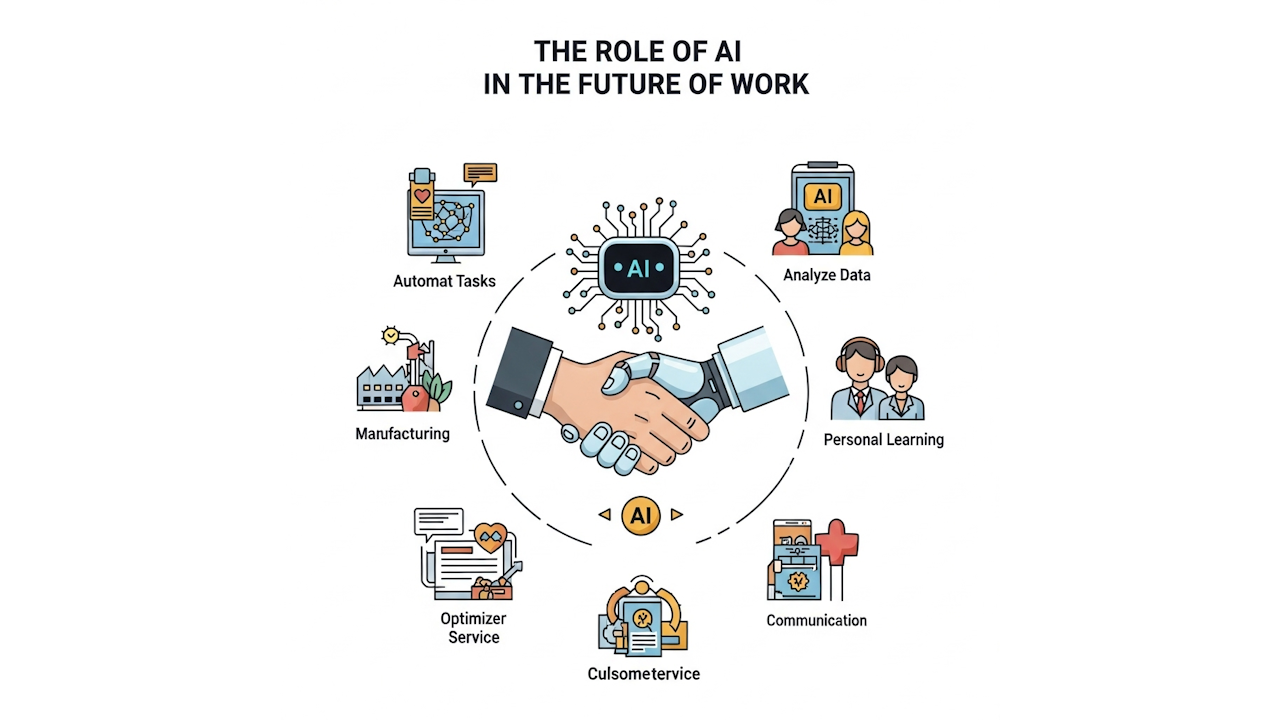The integration of Artificial Intelligence (AI) into the fabric of our professional lives is no longer a futuristic fantasy but a rapidly unfolding reality, poised to redefine the very essence of work as we know it. This technological revolution, comparable in impact to the Industrial Revolution, is not merely about automating mundane tasks; it’s about augmenting human capabilities, fostering innovation, and creating entirely new paradigms of work. The transformative potential of AI spans across industries, promising increased productivity, enhanced efficiency, and the opportunity for humans to engage in more meaningful and creative endeavors.
One of the most significant roles of AI in the future of work lies in its capacity to automate repetitive and data-intensive tasks. From manufacturing processes to administrative duties, AI-powered systems can execute these tasks with greater speed, accuracy, and consistency than humans. This automation frees up human workers from the drudgery of routine work, allowing them to focus on tasks that require uniquely human skills such as critical thinking, creativity, emotional intelligence, and complex problem-solving. Imagine a world where AI handles the tedious data entry and analysis, enabling human employees to dedicate their time to strategic planning, innovation, and building stronger relationships with clients and colleagues.
Beyond automation, AI is set to become a powerful tool for augmenting human intelligence and decision-making. AI-powered analytics can process vast amounts of data, identify patterns, and generate insights that would be impossible for humans to discern on their own. This capability will empower professionals across various fields, from business analysts identifying market trends to scientists accelerating research discoveries and healthcare professionals making more accurate diagnoses. The synergy between human expertise and AI’s analytical prowess will lead to more informed decisions, better strategies, and ultimately, more successful outcomes.
The rise of AI will also lead to the creation of entirely new job roles and industries that we can only begin to imagine. As AI systems become more sophisticated, there will be a growing demand for professionals who can develop, implement, maintain, and ethically oversee these technologies. Roles such as AI ethicists, data scientists, machine learning engineers, and AI trainers are already emerging as crucial components of the future workforce. Furthermore, AI’s ability to drive innovation across sectors will likely spawn entirely new industries and business models, creating unforeseen employment opportunities.
However, the integration of AI into the workplace is not without its challenges. Concerns about job displacement due to automation are valid and require proactive strategies to mitigate potential negative impacts. This includes investing in education and training programs to equip workers with the skills needed to adapt to the changing demands of the labor market. Emphasis should be placed on fostering skills that complement AI, such as creativity, critical thinking, and complex communication. Furthermore, exploring new models of work, such as universal basic income or shorter workweeks, might become necessary to address potential shifts in employment landscapes.
Ethical considerations surrounding the use of AI in the workplace are also paramount. Issues such as data privacy, algorithmic bias, and the responsible deployment of AI technologies must be carefully addressed to ensure fairness, transparency, and accountability. Establishing clear ethical guidelines and regulations will be crucial to building trust and ensuring that AI benefits all members of society.
In conclusion, AI is poised to play a transformative role in the future of work. While it presents challenges that need to be addressed thoughtfully and proactively, its potential to augment human capabilities, drive innovation, and create new opportunities is immense. The future of work will likely be characterized by a dynamic collaboration between humans and AI, where each leverages their unique strengths to achieve outcomes that were previously unimaginable. Embracing this technological evolution with a focus on continuous learning, ethical considerations, and a commitment to empowering the workforce will be key to unlocking the full potential of AI and shaping a future of work that is both productive and fulfilling.


